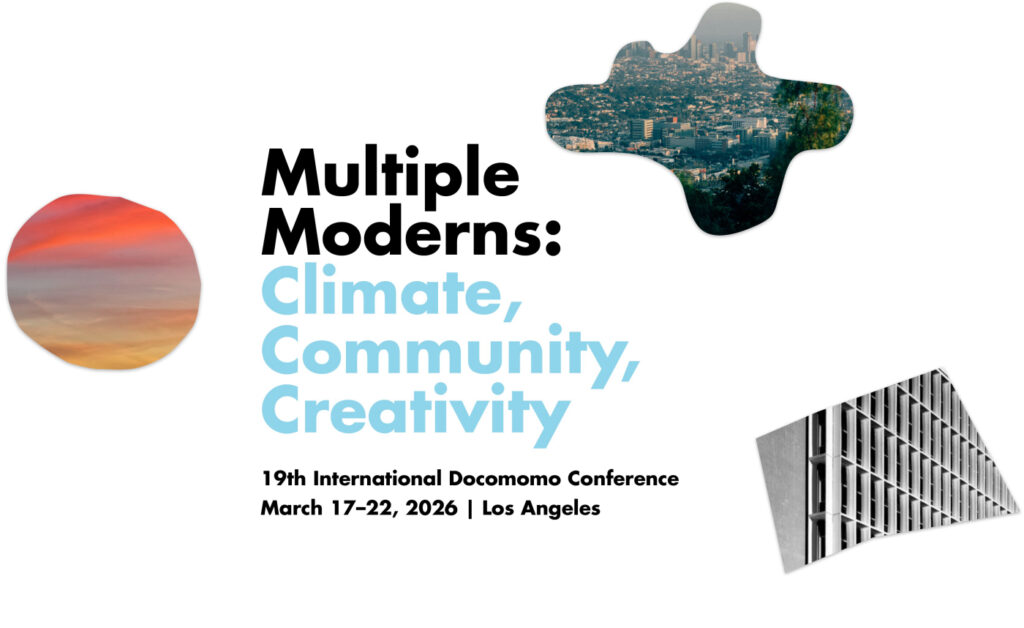News April 2025

19th International Docomomo Conference comes to Los Angeles next March
The biennial International Docomomo Conference will be held in Los Angeles March 17-22, 2026. A Call for Abstractson the topic “Multiple Moderns: Climate, Community, Creativity” opens May 1 and runs through June 2. Docomomo US will host the conference with the direct support of Docomomo US/Southern California Chapter, the University of Southern California, School of Architecture, and Getty. This will be the second time that an international Docomomo conference is held in the US. The first was New York in 2004.
Attendees can look forward to exciting venues, rigorous academic sessions, networking opportunities, social events, and the much-anticipated Docomomo tours. Conference proceedings will be produced.
The 19th International Docomomo Conference will:
Explore the pluralistic nature of the twentieth-century global modern movement and its diverse legacies, examining how climate, community, and creativity have shaped and continue to shape the built environment. Our host city of Los Angeles, an embodiment of multiple moderns, serves as inspiration for the theme.
Examine a range of modern places and urban forms as a starting point for discussion, considering topics related to pre- and post-World War II modern traditions, through the end of the twentieth century. It will highlight the enduring spirit of creativity that spawned late twentieth-century architectural movements such as late modernism, postmodernism, and deconstructivism. It will also explore the everyday modern architecture that is so common in communities around the world.
Investigate urban forms characterized by automobile dependence and sprawling growth that differs from traditional compact urban forms. It will also focus on modern buildings and landscapes through the lens of the climate crisis, including case studies of climate-related adaptation as well as climate-related disaster preparedness and response. It will also look at how diverse communities have created, used, and continue to reshape modern environments to serve their current and future needs.
Conference website
or download a PDF overview
——-
Call for Abstracts (Now closed. Deadline June 2, 2025)
Docomomo International invites practitioners, educators, researchers, and scholars involved in the documentation, conservation, and renovation of buildings, sites, and neighborhoods of the modern movement to submit paper abstracts on the theme Multiple Moderns: Climate, Community, Creativity.
We encourage proposals that support the conference theme and the subthemes described below, that advance our collective practice in the documentation and conservation of modern works, and expand our understanding of modernism globally to assist in the development of educational frameworks and tools for a new generation of designers.
This could include historic research and scholarship, educational and pedagogical applications, and case studies in conservation practice related to one of the following themes:
Mobility and Sprawl
The twentieth century, non-traditional, automobile-oriented megacity and ways it can successfully be adapted to twenty-first-century demands. With its car-oriented infrastructure, megahousing blocks, industrial sites, and huge populations, this pattern of urban development is exemplified by cities like Los Angeles, Taipei, Mexico City, Seoul, and Caracas, to name a few, but can be found in many forms worldwide.
Modernism in the Sun
Looking at modern buildings and landscapes that were originally designed to be responsive to their climates; examining how they have fared over time; how they have been maladapted or misunderstood; and how these sites must respond to and mitigate the effects of climate change, with case studies of resilient and thoughtful adaptation.
Late Twentieth-Century Modernism
Modernisms from mid to late twentieth century, including late modernism, postmodernism, and deconstructivism in their many regional expressions, and any unique advocacy or conservation challenges these buildings face.
Community Adaptation and Repurposing
An investigation of the role that local and regional communities have played in reshaping their own modern environments, including case studies to demonstrate how marginalized and underrecognized communities have both created and adapted spaces to their specific needs.
Creativity and Collaboration
The ways in which collaborations across disciplines (architects; landscape architects; interior, industrial, and graphic designers; engineers; artists; contractors, etc) shaped the modern built environment and continue to contribute to their conservation through practice and education.